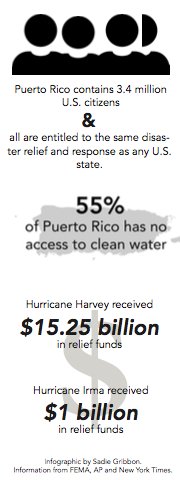Correction: This article previously incorrectly quoted a source in the article, Melissa Camacho, in regards to the following line: “Hurricane Maria, Puerto Rico’s strongest hurricane since 1932, has left the island almost unrecognizable…”. The quote was previously written as a direct quote when it should have been paraphrased. The article has since been changed to correct this.
Two weeks after a Category 4 hurricane struck Puerto Rico, 95 percent of individuals remain without power and 55 percent do not have access to drinking water according to the U.S Department of Defense.
Hurricane Maria, Puerto Rico’s strongest hurricane since 1932, has left the island almost unrecognizable according to Melissa Camacho, an associate broadcast and electronic communication arts professor at SF State, via phone call.
“The island that I grew up in, that island that I know, no longer exists,” she said.
Initial aid to Puerto Rico was stalled by the Jones Act, which prohibits foreign vessels from importing goods to the island and was waived following Hurricanes Harvey and Irma.
“Those of us stateside trying to collect goods, trying to get food … to our loved ones we couldn’t do it because of the Jones Act; we couldn’t have friends who had boats registered in other countrie … get it to them because of the Jones Act,” said Camacho, who still has family in Puerto Rico.
On Thursday, President Donald Trump announced that the U.S will waive the Jones Act for Puerto Rico for 10 days.
“The fact that it’s only been waived for ten days is like a kick in the gut,” Camacho said.
The short time frame, she said, would only allow for basic supplies.
“Ten days is enough to get [an] initial shipment of diesel and other necessities…then the window will close and Puerto Ricans will be required to pay more for the basic things that they need,” Camacho said.
On Tuesday, Trump visited the hurricane-ravaged island and stated in a briefing, “I hate to tell you, Puerto Rico but you’ve thrown our budget a little out of whack.”
In a press conference on Friday, prior to the president’s visit, San Juan mayor Carmen Yulín Cruz pleaded for help.
“I am begging, begging anyone that can hear us, to save us from dying. If anybody out there is listening to us we are dying and you are killing us,” she said.
In response, Trump took to Twitter and stated: “Such poor leadership ability by the Mayor of San Juan, and others in Puerto Rico, who are not able to gather workers to help. They want everything to be done for them.”
According to Camacho, the Puerto Rican government, despite its best efforts, isn’t suited to handle the large-scale devastation.
“It’s a small island dealing with a massive problem,” she said.
In its wake, the hurricane devastated an already vulnerable infrastructure.
“This storm has sent the island back decades. Any progress it’s made in terms of urban development and improving infrastructure, that’s gone,” she said.
Despite the devastation, Camacho said some are choosing to stay on the island.
“My father refuses to leave … this is home, this is his island and he truly believes he has to be there to help,” Camacho said of her father, who is a small-business owner in Puerto Rico and is still trying find a way to pay his employees.
“The same with my brother-in-law, the same with my brother, they feel those who can … want to stay because people have to stay to start rebuilding.”
The best way for those stateside to help, said Camacho, is through monetary donations.
“Rather than sending goods, because that becomes a logistical nightmare … the best thing is to donate money,” she said.
The student government at SF State is currently discussing possible fundraising opportunities, according to Jackie Foley, president of the Associated Students board of directors.
“Nothing is finalized but I am in the process of reaching out to other campus partners and clubs to see if they are working on any projects in regards to the devastation in Puerto [Rico],” Foley said in an email.
As of Monday, according to the Federal Emergency Management Agency, the U.S. Northern Command has scheduled more flights to deliver approximately 30,000 more meals and 136,000 liters of water.
“We have done a great job with the almost impossible situation in Puerto Rico,” said Trump on Twitter. “People are now starting to recognize the amazing work that has been done by FEMA and our great Military.”
Camacho hopes that the president and federal government take more steps to aid in relief efforts.
“I hope that Donald Trump remembers … that Puerto Rico is part of the United States and the 3.5 million Americans that live there deserve the same treatment as any other American citizen living stateside,” said Camacho, who plans to return to the island as soon as she can.





